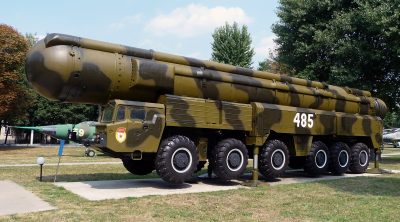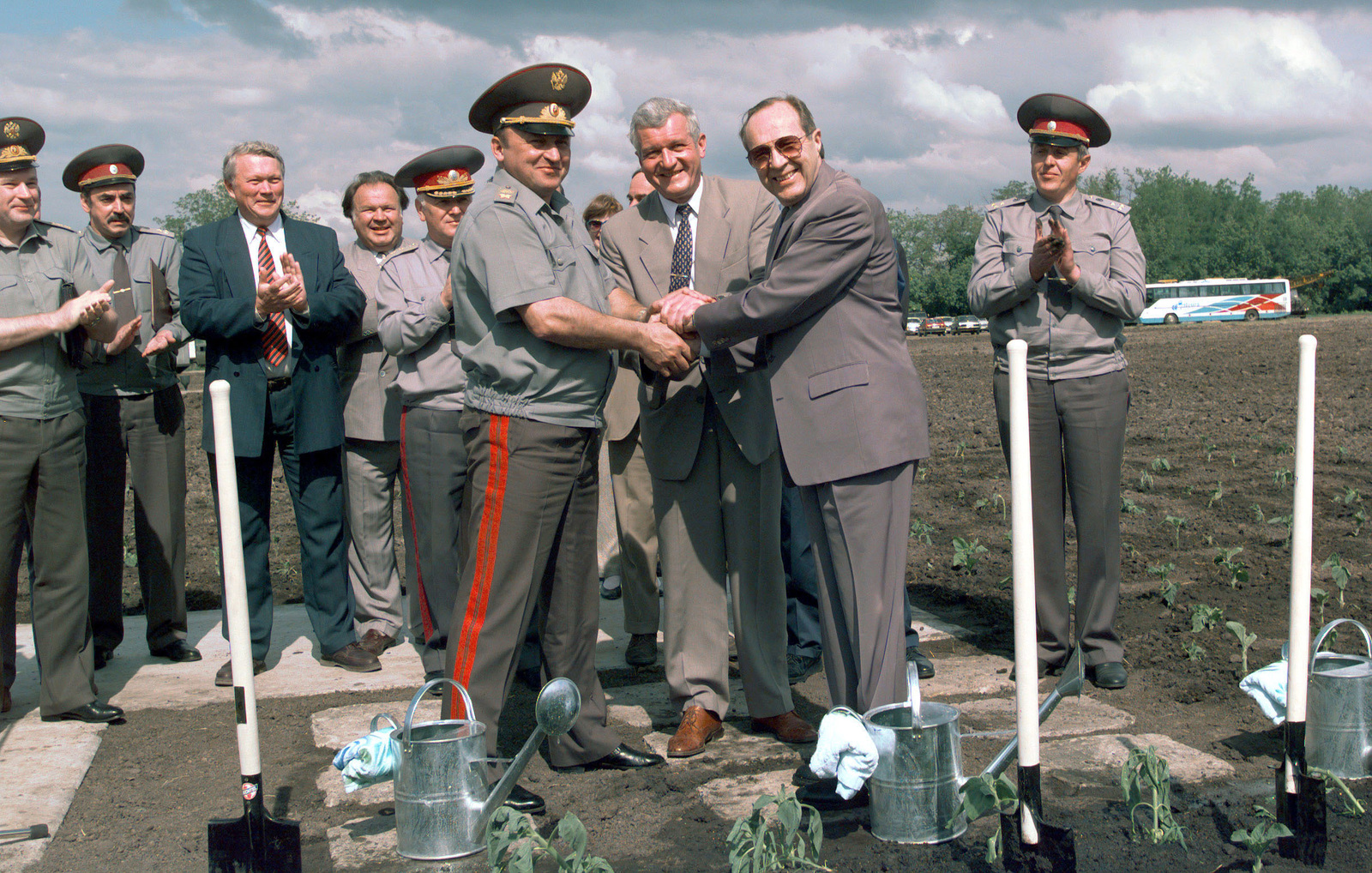What If Ukraine Had Kept Its Nuclear Weapons?
Some say Kyiv would have been in a better position today if it hadn’t been disarmed following the fall of the Soviet Union.

All Global Research articles can be read in 51 languages by activating the Translate Website button below the author’s name.
To receive Global Research’s Daily Newsletter (selected articles), click here.
Follow us on Instagram and Twitter and subscribe to our Telegram Channel. Feel free to repost and share widely Global Research articles.
***
The nuclear disarmament of Belarus, Kazakhstan, and Ukraine was one of the great success stories of the end of the Cold War, and it was one of the most significant victories for the cause of nonproliferation.
When the Soviet Union ceased to exist, these newly independent states had to manage the problem of the Soviet nuclear legacy left behind in their lands. Their disarmament was bound up with their status as independent, sovereign countries as they sought and needed to be integrated with the rest of the world.
The commitment of the non-Russian republics to disarm saved the original Strategic Arms Reduction Treaty (START) and upheld the principles of the Non-Proliferation Treaty (NPT), and their eventual disarmament is one of the underappreciated achievements of U.S. foreign policy in the post-Cold War era.
While all three states were always willing to get rid of the nuclear weapons they had inherited from the Soviet Union, the paths that they took to disarmament were somewhat different with respect to the terms and timing of removing these weapons and their delivery systems from their territories. The Ukrainian case is the most involved of the three, and because of the war in Ukraine it is also the most salient today in current debates about disarmament and nonproliferation. It is therefore fortunate that there is a new book that can expertly guide us through this complicated and important history.
US Secretary of Defense William Perry (left), Ukraine ministry of defense Mr. Schmarov (center) and Russian Ministry of Defense ltgen Grachov (right), celebrate the completed dismantlement of silo 110 and Ukraine’s completed nuclear weapons arsenal dismantlement. Silo 110 was the first of 160 Ukrainian silos to be dismantled in the next two years as part of the Nunn-Lugar / Cooperative Threat Reduction Program. (April 6, 1996)(National Archives)
Mariana Budjeryn’s Inheriting the Bomb: The Collapse of the USSR and the Nuclear Disarmament of Ukraine is an excellent study of how the process of disarmament unfolded. Drawing on a wide range of sources, including some Ukrainian sources not tapped before, Budjeryn details in great depth the internal deliberations of the Ukrainian government and the intensive rounds of negotiations among the U.S., Russia and the three non-Russian republics.
The book should become a standard reference for anyone working on this issue and on nonproliferation more broadly, and I expect that it will.
Budjeryn shows how the Ukrainian government realized that they had no practical alternative to disarmament if they were going to be a full-fledged member of the international community, but they also believed that their country should not give up the weapons without receiving something in return. The Ukrainian government took a nuanced position on the question of disarmament, as they were committed to denuclearization but wanted, for reasons of sovereignty and leverage, to emphasize that they “owned” the weapons on their territory even if they couldn’t and wouldn’t use them.
This insistence on ownership created some tensions in relations with both the U.S. and Russia, and opened Ukraine up to untrue charges of “backsliding” on its commitments. But in the end, Ukraine was never in a position to keep the weapons and did not want to keep them.
One of the most fascinating aspects of the story is how the three non-Russian republics leveraged the U.S. desire to ratify and implement START into securing themselves places at the negotiating table. Russia would have preferred to keep all arms control discussions bilateral, but since START could not be implemented without the cooperation of the other states it became necessary to include them.
This created some interesting contradictions in Washington’s dealings with these states. On the one hand, Washington accepted that the three non-Russian republics were successors to the Soviet Union for the purposes of arms control under START, but it would not accept that they were successors to the Soviet Union’s status as a nuclear weapons state.
The U.S. bottom line was that there should be no additional nuclear weapons states emerging from the collapsed Soviet Union. The NPT was clear that there could only be five nuclear weapons states, and the U.S. was not going to compromise on this point. This meant that Belarus, Kazakhstan, and Ukraine had to commit to joining the NPT as non-nuclear weapons states while simultaneously assisting the U.S. in eliminating part of the Soviet nuclear arsenal that they had in their countries.
It took some time to get all three across the finish line with the ratification of both treaties, but it is a credit to their governments and to the Bush and Clinton administrations that they kept this process moving forward to a successful conclusion.
If Ukraine’s disarmament is discussed today, it is often mentioned as a supposed cautionary tale of what other states shouldn’t do. Shortly after the 2022 Russian invasion began, John Ullyot and Thomas Grant declared Ukraine’s disarmament to have been a mistake: “If you abandon your nuclear program and entrust your security to formal guarantees and conventional deterrence, you gamble with your future. If you give up your nukes, you give up your national security ace-in-the-hole.”
Bill McGurn of The Wall Street Journal asked rhetorically, “If Ukraine hadn’t given up its nukes after the collapse of the Soviet Union, would Vladimir Putin have dared invade?” This line of thinking is misguided for several reasons.
As Budjeryn shows, there really was no serious option of keeping the inherited nuclear weapons without exposing Ukraine to international opprobrium and isolation, and the cost of building up an indigenous nuclear weapons program to maintain their own arsenal was prohibitive. She sums up the Ukrainian foreign ministry’s view at the time: “The negative repercussions of the nuclear option would far outweigh the positive.”
It is a mistake for people today to indulge the fantasy that Ukraine could have kept these weapons without suffering severe negative political and economic consequences, and it gives encouragement to would-be proliferators that our collective commitment to nonproliferation is waning.
Another problem with the counterfactual is that there is no guarantee that Ukraine would have been made more secure if it had paid the high price to retain these weapons. If anything, possession of what would have been the world’s third-largest nuclear arsenal probably would have made Ukraine more of a target for interference and intervention, and the resources it would have had to pour into its nuclear weapons program would have come at the expense of its other defenses.
Budjeryn quotes Boris Tarasyuk, Ukraine’s then-foreign minister, as saying, “For Ukraine to keep nuclear weapons would have been to go against the entire world order.” When critics of disarmament argue that Ukraine should have somehow kept this arsenal, they are ignoring the enormous, immediate costs that Ukraine would have faced for doing so. Ukraine would not only have been putting its good relations with the U.S. and its allies at risk by keeping these weapons, but counterintuitively it would have also risked its own survival.
Budjeryn concludes: “If Ukraine had refused to join the NPT and kept a part of its nuclear inheritance, it would not be the same country it is today but with nuclear weapons. Indeed, it is doubtful whether it would be a country at all.”“Inheriting the Bomb” is essential reading for anyone interested in issues of disarmament and nonproliferation. It is exceptionally well-researched and well-written, and it deepens the reader’s understanding of the complex problems that were created by the collapse of the Soviet Union. It also reminds us of the importance of careful, patient diplomacy in managing multiple potential crises peacefully.
*
Note to readers: Please click the share buttons above. Follow us on Instagram and Twitter and subscribe to our Telegram Channel. Feel free to repost and share widely Global Research articles.
Featured image: Intermediate-range ballistic missile with a nuclear warhead RSD-10 Pioneer. It was deployed by the Soviet Union from 1976 to 1988. NATO reporting name was SS-20 Saber. It was withdrawn from service under the Intermediate-Range Nuclear Forces Treaty. Ukrainian Air Force Museum in Vinnitsa. (Licensed under the Public Domain)


